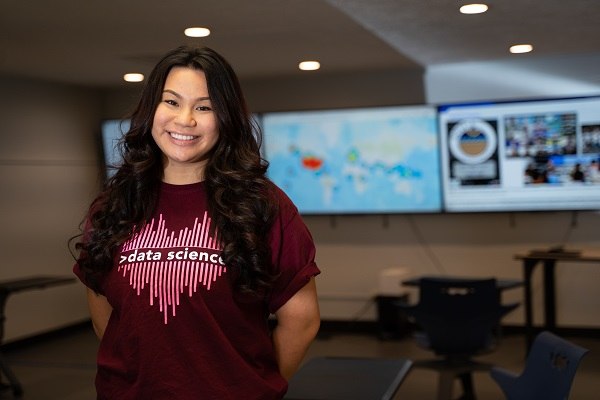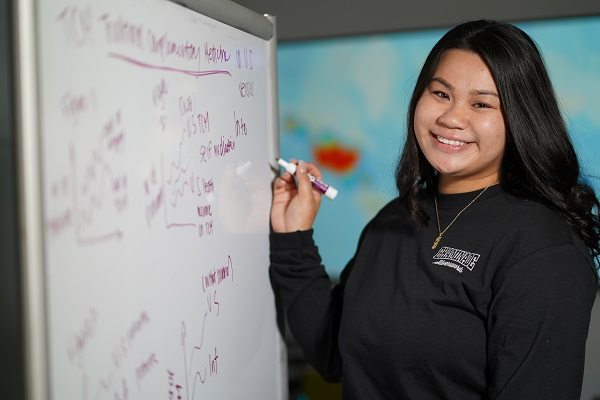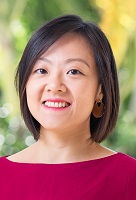
Have you ever wondered what secrets can be found at the ocean’s deepest depths?
So has Nicole Yamase ’14. And then she got to travel there.
In March, Yamase was invited to jump into a special submersible and journey 35,856 feet below the waves (or as she likes to say, about 700 coconut trees stacked on top of one another) into the Challenger Deep—the deepest known spot in the ocean, located in the Mariana Trench.
Yamase, who is Micronesian, is the first Pacific Islander ever to make the trip.
She describes the place as nothing less than “unbelievable”—like an alien world.
“Once we slowly got to the bottom, I couldn’t believe my eyes,” she said, adding that the expedition down with ocean explorer Victor Vescovo—who organized the special dive—started about 10 AM. Four hours later, they were there, staring into the murky, dark and deepest known depths of the ocean.
“It looks like a desert down there,” Yamase said.
Reinforcing passion for environmental studies
Yamase, who graduated from Chaminade with a B.S. in Environmental Studies and a B.S. in Biology and is now seeking a doctoral degree in Marine Biology from the University of Hawai‘i, was chosen for the journey because of her deep passion and previous work in helping to advocate for the oceans.

Vescovo, she said, “thought it was time” that someone from the Federated States of Micronesia was invited down to the Challenger Deep, which can be found in their country’s waters. And not just “someone” was chosen, but a young leader who is studying diverse marine ecosystems.
She got additional support for the journey from the Waitt Institute and Micronesia Conversation Trust.
Yamase said the experience of traveling to Challenger Deep was life-changing. It confirmed the incredible love she has for her research—she’s focused on studying the impacts of climate change on indigenous macroalgae important to Pacific reefs. And it underscored her other major academic focus: raising awareness about how climate change and rising sea levels are already impacting the Pacific.
“Humanity needs to improve its relationship with the world’s oceans,” Yamase said.
Because even the Challenger Deep wasn’t free of humanity’s fingerprint. When she was down there, nearly 7 miles below the surface, she saw boating tethers—human trash. “The fact that trash has made it all the way down to the deep is very alarming,” Yamase said. “It’s just a really pressing problem.”
Yamase knows that better than most.

Climate change is a problem now
When she returns to her hometown of Pohnpei in the Federated States of Micronesia, she sees the rising sea levels lapping up higher than they ever have before. Friends and loved ones post photographs on social media of ocean water going into homes and of cemeteries being washed away.
Climate change isn’t a future problem for her country, she says, it’s a problem now.
And it will take everyone, including her generation and future ones, to fix it.
Opening doors for Pacific Islanders
“Through this expedition, I really just want to promote STEM—because Pacific Islanders, we need us,” Yamase said. “We’re the ones who are going to be in the field. We need local mentors, local role models because that’s what we lack. It really has a huge impact to see your own succeed in the field.”

As she continues to make her mark, Yamase is grateful to her own mentors, including those at Chaminade. She said it was Environmental Science and Studies Dr. Gail Grabowsky, dean of the School of Natural Sciences and Mathematics, who encouraged her as a freshman to apply for a summer internship at UH-Mānoa focused on marine biology. “From that first experience, I was like, ‘oh my goodness, this is for me,’” she said. She continued to be selected for internships and other opportunities, including a chance to study macroalgae in Miami’s Biscayne Bay.
That research formed the basis of the dissertation she’s now working on.
She said Biology Professor Dr. Jolene Cogbill, her adviser in the department, was also hugely instrumental in getting her linked up with opportunities that honed her skills—and bolstered her confidence. “They both really pushed me out of my comfort zone,” she said. “My first year, I never raised my hand. I couldn’t do it. After these summer internships of really participating in these opportunities with other Pacific Islanders, I thought, ‘I’m not alone in this.’”

Yamase said she also got the chance to present her work at conferences and symposia.
She said she hopes to be that same inspiration to other young Pacific Islanders, especially those in environmental science, marine conservation and biology. She said her expedition into the Challenger Deep “was such a great opportunity to show young Pacific Islanders that we can do it.”
“There’s not that many of us in the science fields. Hopefully, this opens up doors.”
















